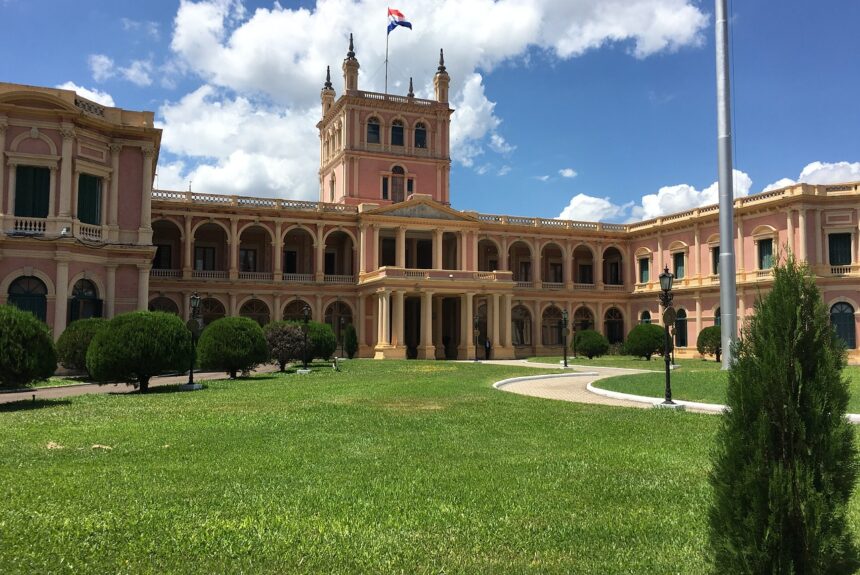At the recent meeting of the G20, leaders of the world’s largest economies discussed the challenges that developing nations will face in the coming decades. A key priority is finding ways to reduce carbon dioxide emissions. “Recognizing that developing countries need to be supported in their transitions to low carbon/emissions, we will work towards facilitating low-cost financing for them,” the group’s 2023 declaration says.
But some developing nations aren’t waiting for help to arrive. They are being proactive. A recent visit to Paraguay highlights what can happen when a developing country has serious leadership that promotes economic freedom and pursues intelligent diplomacy.
>>>READ: Strong US-South Korea Relations are Key for the Future of Freedom (and Climate)
Earlier this year, Santiago Peña of the Colorado Party scored a convincing victory in Paraguay’s presidential race. His victory speech was a fitting combination of humility and confidence. “We’re not celebrating a personal triumph, we’re celebrating the victory of a people who with their vote chose the path of social peace, dialogue, fraternity, and national reconciliation,” he told voters.
Neighboring Brazil’s president immediately offered congratulations. “We will work together for even better and stronger relations between our countries, and for a South America with more unity, development and prosperity,” he vowed.
Brazil isn’t the only country to celebrate Peña’s democratic triumph. The Taiwanese embassy also congratulated him via social media. Paraguay is the only country in South America that maintains diplomatic relations with Taiwan. “We have a diplomatic and historic relationship with Taiwan of more than 60 years, based on principles and democratic values that we believe are fundamental for a society like Paraguay,” Peña said.
Even as he supports relations with Taiwan, though, Peña is also promising to seek out more trade with China. We will see whether Beijing is willing to engage. More trade would be better for the economies of both countries, and freer trade helps improve the environment as well. But Peña makes it clear his country will not cut ties with Taiwan just to please mainland China.
In August, I had the honor of attending Peña’s inauguration with my friend and free-market stalwart the Rt. Hon. Dr. Liam Fox, a member of Britain’s parliament and the country’s former Secretary of State for International Trade. We toured the capital city of Asunción and met with business leaders and energy, environment and trade officials. One thing was clear, beyond the genuine kindness of the people, Paraguay is a developing country that is committed to free market solutions to solve 21st-century problems.
Take energy and the environment for example. Paraguay already generates nearly 100 percent of its electricity from hydropower, one of the cleanest forms of renewable, zero-emission energy there is. In addition, Paraguay generates so much hydropower that it exports 90 percent of its generation to its neighbors, Argentina and Brazil. Not stopping there, Paraguay is committed to diversifying its energy mix from other renewable energy sources, so it won’t have to rely entirely on hydropower that comes from just three dams. And why not, especially when the country is so blessed with abundant sun for solar energy, and biomass that could be sourced from keeping their forests healthy.
>>>READ: Elevating the Standards for Carbon Offset Projects
The country is also hosting massive REDD+ projects (Reducing Emissions from Deforestation and forest Degradation in developing countries) to protect forests and reduce carbon emissions. For example, the Chaco Vivo project in the Gran Chaco Forest in Paraguay is promoting sustainable land management practices and conserving forest resources to protect some 187,000 hectares, and eventually up to 600,000 hectares, of critically threatened ecosystems in Paraguay. This project involves actually owning the land as protected private property, thus protecting it from the “tragedy of the commons,” which can occur when nobody owns a resource. “The impact of Project Chaco Vivo is truly inspiring,” said Mr. Kiantar Betancourt, president of the project. “Not only are we reducing emissions and promoting sustainable land use, but we are also creating economic opportunities for marginalized communities, both traditional rural and Indigenous. This is a win-win situation for everyone involved, and I am proud to be a part of this development.”
Another REDD+ effort is the Corazón Verde del Chaco Project, which has already reduced greenhouse gas emissions by an estimated 5.6 million tons of CO2. “This REDD+ project is the beginning of a paradigm shift in the Chaco,” says James Eaton, Director at Ostrya Conservation. “Private landowners can now earn returns from forest conservation rather than clearing forest and expanding cattle ranches.” This project works by leasing land from existing owners and maintaining it as forest, instead of clearing it for farming or timber profits.
Both approaches recognize the importance of protecting forest land by respecting property rights and providing economic opportunities for people in local communities by working in partnership with local, state and federal governments.
Paraguay’s new government is committed to governing accountably, improving relationships with its neighbors as well as the United States, and unleashing free market capitalism rather than Chinese-style government-guided capitalism. It is refreshing to see a serious president, one who was elected for supporting powerful ideas instead of running a campaign based on personal popularity.
As the heart of South America, Paraguay is leading the way for other developing nations to follow.
The views and opinions expressed are those of the author’s and do not necessarily reflect the official policy or position of C3.
